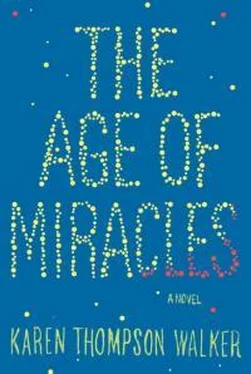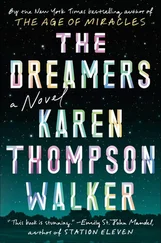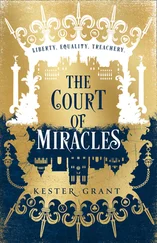“Do something fun with it,” he said.
I squeezed his hand and nodded.
“And Julia,” he said. “Don’t believe everything you hear, okay? You’re a smart girl. You can read between the lines.”
We took what we always referred to as the scenic route home, back roads with less traffic. We listened to the news on the radio as we drove. Reporters from around the world were describing local reactions. From South America streamed more reports of gravity sickness. The Centers for Disease Control were investigating.
“Jesus,” said my mother. “Tell me if you start to feel sick.”
At that moment, I did begin to feel a little dizzy.
“This disease seems to be affecting some people more than others,” said one official on the radio. “And the name of this disease is paranoia.”
In our own country, according to the radio, clusters of born-again Christians were making their final arrangements, hoping at any moment to be summoned from their beds, leaving behind empty houses and piles of crumpled clothing where their bodies once stood.
“I don’t get it,” I said. “Why wouldn’t your clothes come with you?”
“I don’t know, honey,” said my mother. “You know we don’t believe in that stuff.”
We were a different kind of Christian, the quiet, reasonable kind, a breed embarrassed by the mention of miracles.
They were interviewing a televangelist on the radio. “The signs of the revelation have been in place for years,” he said. “We’ve known it was coming ever since the restoration of Israel.”
As the road turned, I could see a sliver of shining ocean through a gap in the hills ahead. All the beachfront homes had been evacuated by then—no one knew what might happen to the tides.
Outside, housing developments streaked past the window, the homes and the lots shrinking in size as we neared the coast. The land was so valuable near the ocean that some houses hung out over the edges of canyons, supported on one side by giant stilts.
We came to a stop sign, and as my mother turned her head from right to left to check for traffic, I noticed the skinny path of gray that sometimes ran along the part in her hair where the roots showed through the dark dye. She’d gone gray at thirty-five, and I never liked seeing it, that earliest sign of her physical decline.
I felt a wave of loneliness. It occurred to me for perhaps the first time, as the car lurched forward, that if anything were to happen to my family, I’d be all alone in the world.
We were passing the fairgrounds now. The county fair was scheduled to open its gates in a week. Hanna and I had been planning to go on opening day.
Usually, the construction workers worked nonstop to get the rides up and running. But I saw as we passed that the construction had ceased. I imagined the workers and the carnies had fled to their hometowns, too—everyone wanted to be close to their families. The roller coasters stood half built, colored skeletons in the wind. The log ride, incomplete, was a suicide leap. The Ferris wheel stood only partially erect: A single red bucket dangled from a single spoke like the last fruit of summer, or like autumn’s final leaf.
For a while the days still felt like days. The sun rose and the sun also set. Darkness was followed by light. I remember the cool swell of morning, the slow burn of afternoon, the sluggishness of dusk. Civil twilight stretched for hours before fading finally into night. Time slunk lazily by, slower and slower as it passed.
With each new morning, we fell further out of step with the clocks. The earth still turned and the clocks still ticked, but they now kept different times. Within a week, midnight no longer necessarily struck at some dark hour of night. The clocks might hit nine A.M. in the middle of the day. Noon sometimes landed at sunset.
Those were chaotic, makeshift days.
Every morning officials announced the minutes gained overnight, like raindrops collected in pans. The totals varied wildly, and we never knew what to expect. Our school start time was decided at sunrise each day—it was always different, and I remember watching the local news channel with my mother in the mornings, waiting to hear what time they’d choose.
More and more kids stopped coming to school.
Extra hours emerged between the cracks in workers’ shifts. Planes were grounded for days, and trains were halted on tracks until new scheduling schemes could be invented and put into place. Timetables had to be tossed out and reimagined every day.
We improvised. We adapted. We made do.
My mother slowly packed our cupboards full of emergency supplies. She accumulated them gradually, a rising tide of condensed milk and canned peas, dried fruit and preserves, four dozen cans of soup. She never returned to the house anymore without a package of batteries under her arm, or a box of tapered candles, or more dehydrated food sealed in plastic or aluminum—the unperishable, the unending, the never-ever-to-expire.
Meanwhile, my soccer team practiced mostly as usual, and my mother’s drama students continued to rehearse their production of Macbeth . All across the country, events like these were held as planned. Shows had to go on. We clung to anything previously scheduled. To cancel seemed immoral, or it might mean we’d given up or lost hope.
New minutes surfaced everywhere. Time was harder to waste. The pace of living seemed to slow.
Some say that the slowing affected us in a thousand other unacknowledged ways, from the life expectancy of lightbulbs to the rate at which ice melted and water boiled and human cells multiplied and human cells died. Some say that our bodies aged less rapidly in the days immediately following the start of the slowing, that the dying died slower deaths, that babies took longer to be born. There is some evidence that menstrual cycles lengthened ever so slightly in those first two weeks. But these effects were the stuff of anecdote, not science. Physicists will tell you that if anything, the opposite should have been true: It’s the man on the speeding train who experiences time more slowly, and not the other way around. As far as I could tell, the grass grew as it always had, the bread in our bread box molded at the usual pace, and the apples on Mr. Valencia’s apple tree next door ripened as they did every fall, then dropped to the ground, rotting among the weeds at what seemed the traditional speed.
All the while, the clocks continued to tick. Wristwatches went right on beating faint beats. My grandfather’s antique clocks chimed their ancient chimes. Church bells rang every hour on the hour.
A week passed, then two. Every time the phone rang in our house, I hoped it would be Hanna. She still hadn’t called.
The stream of new minutes continued to flow. Our days were soon approaching thirty hours.
How quaint the old twenty-four-hour clock began to look to our eyes, how impossibly clean-cut, with its twin sets of twelve, as neat as walnut shells. How had we believed, we wondered, in such simplistic things?
In the second week after the start of the slowing, something began to happen to the birds.
You’d find pigeons scrambling on sidewalks, wings dragging, feathers scraping the pavement as they walked. Sparrows were dropping on lawns. Flocks of geese were seen traveling great distances on foot. The bodies of seagulls were washing up on the beaches. Birds were found dead on our streets and our rooftops, on our tennis courts and our soccer fields. The fowl of the air were falling to the earth. It was happening all over the world.
No one knew why.
You were supposed to call animal control whenever you found a dead one, but my father refused. There were too many, he said, so we just threw them away, like that first dead bird on our deck.
Читать дальше












